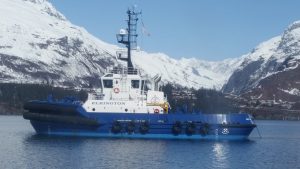Human error, severe weather, complex geography, mechanical failure – any of these can contribute to an emergency involving a laden oil tanker in Prince William Sound.
A disabled tanker requires immediate action. Prince William Sound is home to a world-class system of tanker escorts, which provides a variety of emergency and spill prevention services such as iceberg detection, tanker rescues, immediate spill response, and more.
What is the tanker escort system?

To fulfill their contract, Edison Chouest built nine new tugs and four spill response barges, which represents a significant improvement for the oil spill prevention and response system. In some cases, new general-purpose tugs replaced conventional tugs that were over 40 years old. Photo by Jeremy Robida.
In Prince William Sound, two high-powered, state-of-the-art tugs accompany every oil-laden tanker travelling through the Sound and out to the Gulf of Alaska.
The heart of the oil-spill prevention system in the Sound is the fleet of tanker escorts operated by Alyeska’s Ship Escort/Response Vessel System, commonly referred to as “SERVS.” Thanks to years of study and analysis, and considerable investment by the shipping industry, this system is widely considered the best in the world.
Find out more about Prince William Sound’s tanker escort zones and the requirements for the varying geographical areas.
The purpose of this system is to have escorts in place to:
- Monitor conditions
- Alert the tanker of problems before they occur
- Assist a disabled tanker as quickly as possible
- Start the cleanup in the event of a spill
At least one of the two escorts is equipped with containment boom, oil skimmers, a work boat to deploy boom, storage for recovered oil, and a trained response crew.
Escort vessels accompany the tankers from the berths at Valdez across Prince William Sound, through Hinchinbrook Entrance, and into the Gulf of Alaska. Three “escort zones”, Northern Prince William Sound, Central Prince William Sound, and the Hinchinbrook Entrance have varying escort requirements.
This system of complex zones was developed to ensure safe, secure passage through all areas of the Sound.
Why is this system so important?
Preventing oil spills is the council’s number one priority. The escort system safeguards against oil spills caused by navigational errors, Alaska’s frequent extreme weather, and human error.
The U.S. Coast Guard estimates that nearly 85 percent of oil spills and marine accidents are caused by human error.
We must remember that, while double-hulled tankers are a great technological advance and help reduce spill severity, double hulls cannot prevent all spills. Tanker escorts are still a crucial defense against oil spills.
Prevention is the most important tool available to prevent environmental damage to Prince William Sound from oil spills. The fact remains that, despite vast technological improvements and training, oil spills are still extremely difficult to clean up.
Escort tugs are able to interrupt the chain of events that cause accidents to occur. If a vessel veers off course while maneuvering through the treacherous waters of Prince William Sound, strong towlines can quickly connect the tanker to one of the tugs. The powerful escort tug engines have the capacity to slow or divert even the heaviest of the Sound’s tankers in short order.
Besides spill prevention, escort vessels in Prince William Sound have many responsibilities. Daily duties include assisting tankers while docking and undocking and escorting laden tankers through Prince William Sound. They also carry spill response equipment for quick response to spills. Containment boom to surround and contain spilled oil, oil skimmers to skim oil from the surface of the water, and storage capacity for recovered oil are all on hand for immediate deployment. Specially trained spill response personnel are on board and ready to act should an accident occur. Tugs are also equipped with firefighting capabilities for emergencies.